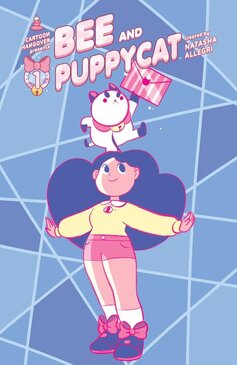|
Written by Brenna M. Williams, M.S., Fourth Year Graduate Student I have a confession to make. I love animation. I’m talking Disney, Pixar, Cartoon Network, Japanese anime. All of it. I have loved animation since I was a little kid, and today as a 25-year-old PhD student, I continue to browse for the latest popular animated television shows on Netflix and HBO Max. I couldn’t tell you exactly why I love animation so much, but as an adult, I think it has a lot to do with the characters. I relate to and admire many of the characters as they develop. However, it is a privilege to relate to these characters, and I am privileged to have grown up with characters that share many of my identities and reflect my appearance and my beliefs. The world of animation is growing more and more diverse, with incredible animators from all backgrounds designing characters that reflect the variety of human beings in the world. This representation is important for children and adults alike. Positive representation (that is, portrayal of people in a positive and uplifting light) of individuals from marginalized communities, including people of color, women, LGBTQ+ individuals, and fat people can lead to increased self-esteem and decreased bias. Given how influential media is, positive representation in animation can have an impact on society. Shows like She-Ra and the Princesses of Power and Kipo and the Age of Wonderbeasts, with their diverse characters and cast, have already started making an impact. Given my specialty in eating disorders, I also think it’s important that animators design characters of all different body types. It’s also important that these characters’ bodies are portrayed positively, especially those in larger bodies. By showcasing characters of all body shapes and sizes, we can increase the representation of diverse bodies and challenge weight stigma and fatphobia. Throughout my adventures through animated shows, I have found some shows and movies that represent individuals with a variety of body types in a positive light. In this blog post, I share three of my favorites.  Steven Universe (2013-2019; ~10+ years old) Steven Universe is an animated television show that originally aired on Cartoon Network and is now available on Hulu or HBO Max. Steven Universe is a coming-of-age story about a young boy named Steven Universe who lives with the Crystal Gems in Beach City. The Crystal Gems are magical, humanoid aliens with special powers. This show explores themes of love, family, and relationships, and it features characters of all colors, genders, sexualities, and shapes and sizes. This series was created by Rebecca Sugar (she/they), who is both the first woman and non-binary person to independently create a series for Cartoon Network. The voice cast is also diverse, with women of color making up the majority of the main cast. Steven Universe is known for paving the way for many more recent LGBTQ+ series, and it focused on many LGBTQ+ themes prior to the SCOTUS ruling making same-sex marriage legal throughout the United States. Steven Universe was nominated for five Emmy Awards and is a beloved series by many. In 2019, a movie was also released, and a spin-off series, Steven Universe Future, was streamed from 2019-2020. I recently just started watching this series for the first time, and I am in love. Steven is a character unlike any other I have seen, and the mysteries of his family and the Crystal Gems has kept me watching for hours on end. This is definitely a series worth watching!  She-Ra and the Princesses of Power (2018-2020; ~8+ years old) She-Ra and the Princesses of Power is a reboot of the 1985 series She-Ra: Princes of Power. Available on Netflix, She-Ra and the Princesses of Power follows Adora, a teenager who finds out she can transform into the legendary heroine She-Ra, and her friends as they work to build the Princess Alliance and defeat the evil Horde. This series showcases characters of all shapes, sizes, colors, sexualities, and genders. Importantly, it includes a diverse cast as well. She-Ra and the Princesses of Power explores a variety of themes, including family, justice, and relationships and is best known for its exploration of LGBTQ+ themes. This one of my absolute favorites because of its character building and sense of humor. I shared this with my boyfriend and my roommate (who both loved it), and I recommend it to pretty much anyone who lets me.  Bee and PuppyCat (2013-Present; ~13+ years old) Bee and PuppyCat is an animated web series that follows Bee, an unemployed young woman, and PuppyCat, a mysterious creature that appears to be a cat-dog hybrid, as they work various temporary jobs together. The art style of this show is beautiful, and it has been compared to the work of Hayao Miyazaki. The characters are designed in a way that represents a variety of body types, and I especially love how Bee looks like an average woman in her 20s. The first season is available on YouTube, and season 2 is scheduled to stream on Netflix in 2022. There is still a great deal to learn about the characters and their backstories, but this storyline has become one of my favorites. I especially love PuppyCat, who is voiced by Oliver, a Vocaloid. I’m looking forward to watching the second season on Netflix, but in the meantime, I’ll keep watching the first season on repeat. I love animation. I love the art and the characters, and I especially love when the character design and development is focused on diversity. There are so many incredible series and movies out there that include main characters who represent many different backgrounds. I am looking forward to seeing more of these characters, and I hope that animators will continue to design characters that positively represent individuals of all body sizes.
4 Comments
|
Archives
January 2024
Categories |
- About
- People
- Our Research & Publications
-
Participate in Research
- Personalized Interventions and Outcomes: Navigating Eating Disorder Experiences and Recovery (PIONEER) Study (Online)
- Youth Eating Study (YES!)
- Tracking Restriction, Affect and Cognitions (TRAC) Study (Online)
- Virtual Reality Study
- Facing Eating Disorder Fears Study (Online)
- Personalized Treatment and CBT-E Study (Online)
- Body Project Summer Camp
- The Body Project
- Clinical Screener Study (Online)
- Clinic, Supervision, and Consultation
- Blog & In the Press
-
Archived Studies
- Predicting Recovery Study (Online)
- Online Single Session Resources
- Reconnecting to Internal Sensations and Experiences (RISE) Study
- Web-Based Mindfulness Study
- Personalized Treatment Study
- Online Imaginal Exposure Study
- In-Vivo Imaginal Exposure Study
- Daily Habits 3 Study
- Daily Mood Study
- COVID-19 Daily Impact Study
- Conquering fear foods study
- Louisville Pregnancy Study
- Approach and Avoidance in AN (AAA) Study
- Web-Based Mindfulness for AN & BN Study
- Barriers to Treatment Access (BTA) Study!
- Mindful Self-Compassion Study
- Network EMA Study
- Legacy of Hope Summit Report
- DONATE-CURE EATING DISORDERS!
- Directions
- Statistical Consultation
- About
- People
- Our Research & Publications
-
Participate in Research
- Personalized Interventions and Outcomes: Navigating Eating Disorder Experiences and Recovery (PIONEER) Study (Online)
- Youth Eating Study (YES!)
- Tracking Restriction, Affect and Cognitions (TRAC) Study (Online)
- Virtual Reality Study
- Facing Eating Disorder Fears Study (Online)
- Personalized Treatment and CBT-E Study (Online)
- Body Project Summer Camp
- The Body Project
- Clinical Screener Study (Online)
- Clinic, Supervision, and Consultation
- Blog & In the Press
-
Archived Studies
- Predicting Recovery Study (Online)
- Online Single Session Resources
- Reconnecting to Internal Sensations and Experiences (RISE) Study
- Web-Based Mindfulness Study
- Personalized Treatment Study
- Online Imaginal Exposure Study
- In-Vivo Imaginal Exposure Study
- Daily Habits 3 Study
- Daily Mood Study
- COVID-19 Daily Impact Study
- Conquering fear foods study
- Louisville Pregnancy Study
- Approach and Avoidance in AN (AAA) Study
- Web-Based Mindfulness for AN & BN Study
- Barriers to Treatment Access (BTA) Study!
- Mindful Self-Compassion Study
- Network EMA Study
- Legacy of Hope Summit Report
- DONATE-CURE EATING DISORDERS!
- Directions
- Statistical Consultation

 RSS Feed
RSS Feed
